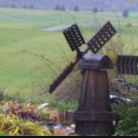
I was either 10 or 11. Our family had driven out to the lake for a day of fun. And here I was laying across a ski board tethered by rope to my uncle’s boat. I was either very brave or very foolish, but found myself being pulled across the water clinging to that board, enjoying the ride!
Until the boat took a fast turn… and the wake caught me off guard. The board flipped over, hit me on the head, and I lost my grip. Flailing furiously in the water, I tumbled over and over, struggling to hold my breath, trying to break the surface for air when I felt something under my feet… all in a matter of some very long seconds. Planting my feet down, I stood up and dared to open my eyes… shocked and absolutely relieved to find I was chest deep in water, standing on a very large rock or ledge in the “middle” of the lower end of the large lake!
I was so sure I would drown while flailing around… instead, I was safe! Trauma clicked in later. I cannot float, nor can I swim. I sink. Don’t even try to teach me… Ed tried when we were dating, and he quickly found out my panic was very real when he let go of me in the deep end of the pool. I still need to wear floaties to enjoy being in the water.
I’ve long realized I was held in the arms of God that day decades ago. No one dreamed there would possibly be a rock or ledge with shallow water out there. My father watched from the shore with his heart in his throat, afraid for my life. But he never told me that until decades later.
This incident reminds me of how we are loved and held safe in the arms of not only God, but the arms of our family. As a helpless infant, we are tenderly held and kept safe in our parents’ arms. As we grow up, their loving arms are still there… ready to protect us and guide us. Then, all too soon we’re ready to leave the nest and fly off into the world on our own. At some point between thinking we know it all and realizing we don’t, we bring the wisdom we’ve learned back to our aging parents, understanding what it was they tried to teach us as we now teach our children… and find we’ve come full circle.
And therein I see the arms of God… holding and caring for us, teaching and guiding us… accepting us for who we are because He created us and knows who we are meant to be.
Safe In My Arms
Linda A. Roorda
From the very moment that you came to be
You were held safe, safe in my arms
A helpless babe, you looked up to me
Your needs were met with love undivided.
~
When you fell down and bruised your ego
You came running to comforting arms
You looked for me to answer concerns
Questions of life with wisdom to gain.
~
But as you grew you looked to yourself
I wasn’t needed, not so much anymore
You thought you held the keys to life’s goals
As facing forward you met the world’s pace.
~
And then one day you understood all
The depths of love and sacrificial gifts
Your arms reached out to hold me secure
To share with me wisdom you had gained.
~
Is it not true full circle we’ve come
From infant small to adult mature
And is it not true the life we have lived
Is mirrored within God’s love for us all.
~
For didn’t His arms hold tightly our life
That when we fell He gently restored
And when we stood alone on life’s stage
We were held safe, safe in His arms.
~~
- Read more...
- 0 comments
- 40 views

